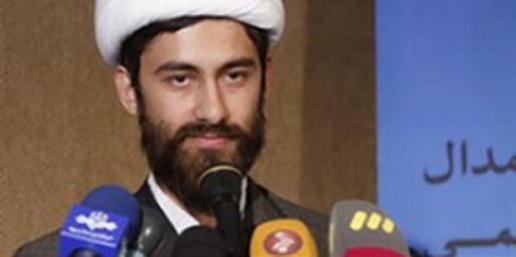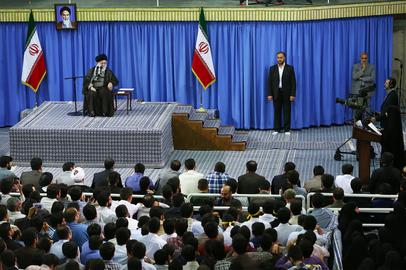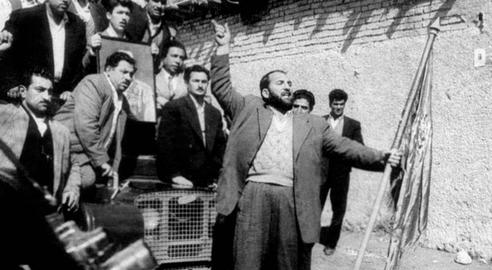On August 28, Heydar Abbasi, a student at Meshkat Seminary, had planned to deliver a speech during the Supreme Leader Ayatollah Ali Khamenei’s visit with Tehran seminary students.
In the end, he was not allowed to make the speech.
So what happened?
“In the process of choosing speakers at the meeting, there was a final step where the selected speakers had to read their speech to a group of elders and officials,” Abbasi said. “The text was approved and modified by them.” He added that anything that wasn’t approved would not be presented to the leader, and the committee charged with reviewing the content was careful in its selection of speakers, and rigorous in its demands to alter content. “But they provided no clear or exact criteria for the content,” Abbasi said — apart from the fact that the leader should “like it,” a phrase the committee repeated several times. Then, Abbasi said, they “removed text or approved it based on their own understanding and taste. In general, they were opposed to any seriously critical or challenging text. Only a few of the grandees present — a minority — believed that criticisms of the regime and the Islamic Republic government could be brought up.” He said that one gentleman, a man held in high regard by Iran’s Hezbollah, gave examples of what the leader (or “Sir” as they also referred to him) had liked from speeches and presentations in the past. “Sir does not like harsh and critical words; one must talk in a way that Sir likes,” Abbasi said.
Heydar Abbasi read his speech to the review board, but they rejected it.
Keyvan Ebrahimi, a friend of Heydar Abbasi, revealed in a tweet that the “gentleman” who instructed seminary students on the “Sir must like it” criteria is an influential conservative cleric by the name of Hojatoleslam Alireza Panahian. Panahian, who heads the Supreme Leader’s “think tank for universities,” is considered to be one of Khamenei’s office’s favorite speakers. He also once declared that westernized Iranians are no different from members of ISIS.
To protest against his speech being banned, Heydar Abbasi has now published the undelivered speech online [Persian link]. In it, he is critical of Ayatollah Khamenei on a number of points.
What about The People’s Participation?
The speech starts out with Abbasi saying he considers it to be his his duty to inform the Supreme Leader of the views of the university and those of seminary students, who have been working for years to realize the ideals of the revolution. Today, he says, their voices are mostly ignored. He talks about Khamenei’s “five stages” for achieving an Islamic civilization — Islamic Revolution, Islamic government, Islamic state, Islamic society and, finally, Islamic civilization. But, he says, the process is too top-down, “contrary to the ideals of the Islamic Revolution” in which “people must participate in handling all affairs.”
For years now, the “resistance economy” has been one of Ayatollah Khamenei’s favorite refrains, aimed mainly against moderates who want to open Iran to the world and integrate the Iranian economy within the global one. Young seminarian Heydar Abbasi, however, does not buy it. “In this process, a global worldview plays a minor role,” he says. “All efforts are aimed at making it domestically, and ideas like the economy of resistance exasperate such a mentality. Is such an approach possible in today’s world, where relations have greatly expanded and regional improvements are almost impossible without global improvements?” He argues that the approach could mean the Islamic Republic plays a passive role when it comes to engaging with world powers.
During Mahmoud Ahmadinejad’s presidency (2005-2013), he points out, a number of principlists believed that “the Islamic state” was in hand, and it was time to work for “Islamic society.” With Hassan Rouhani as president, however, it is not clear whether these conservatives still believe that “the Islamic state” has been achieved and they can move on to the next stage.
Heydar Abbasi’s next criticism is pointed at people close to Khamenei who, he says, have reduced everything they do to classifying Khamenei’s statements and commenting on them. “Are all mental activities about revolutionary ideals only correct when they are limited to statements by Your Excellency?” he asks, adding that this stance could harm the very ideals that Ayatollah Khomeini, the founder of the Islamic republic, had promoted.
What about justice and freedom?
Abbasi then indirectly criticizes the Supreme Leader, whom he respectfully accuses of ignoring the ideals of the revolution. “Your Excellency has repeatedly said if the revolution seriously loses its way you would consider it your duty to prevent it,” Abbasi reminds him, going on to say that “material” affairs such as the economy and technology have become officials’ main criteria for success. “Even in your new year statements about the achievements of the system, Your Excellency barely mentioned ideals...such as justice, freedom, and helping the underprivileged. The question is: Do you really consider these material criteria as the main criteria for the success of the system? Should we judge the system with the same criteria?”
Abbasi is most harshly critical about corruption in society. But why, he asks, does the Supreme Leader no longer speak out against it? He warns Khamenei that many young people attached to the revolution are seriously troubled by incompetence and corruption within institutions under the control of the Supreme Leader and his “appointees.” “You have been informed repeatedly about this problem in meetings with students, but your answers have not satisfied the young people,” he says.
Abbasi cites as examples the incompetence of the “sacred” Guardian Council and corruption in the judiciary. “You asked the young people ‘to fire at will!’ Now they ask whether your order is limited to elected institutions or applied to those appointed [by you] as well?”
It is yet too soon to gauge the full reaction to Abbasi’s statements, but in his personal Telegram channel, he himself foresees trouble ahead. Almost immediately after his speech was published, principlists launched the hashtag #Sir_Must_Like, either to directly criticize the seminary student, or to ask others about the speech selection process.
Komeil Bagherzadeh, who was at the meeting, defended the “Sir must like it” approach to selection, and argued that the purpose was to ensure that speeches were “solid and logical.” He said it was only natural that “solid texts were selected and weaker ones were rejected.” Another attendee, Mohammad Mehdi Dadman, said that students were expected to be positive, and wrote that Panahian meant to say “instead of absolute criticism, use statements that do not dash hope for improvement and say encouraging things as well.” And he emphasized that Heydar Abbasi’s speech was the only one to be rejected. Nevertheless, Dadman agreed with Abbasi’s critique of the selection process, saying it was not as transparent as it could be. “Some of the gentlemen were almost against any kind of criticism,” he said.
visit the accountability section
In this section of Iran Wire, you can contact the officials and launch your campaign for various problems


























comments